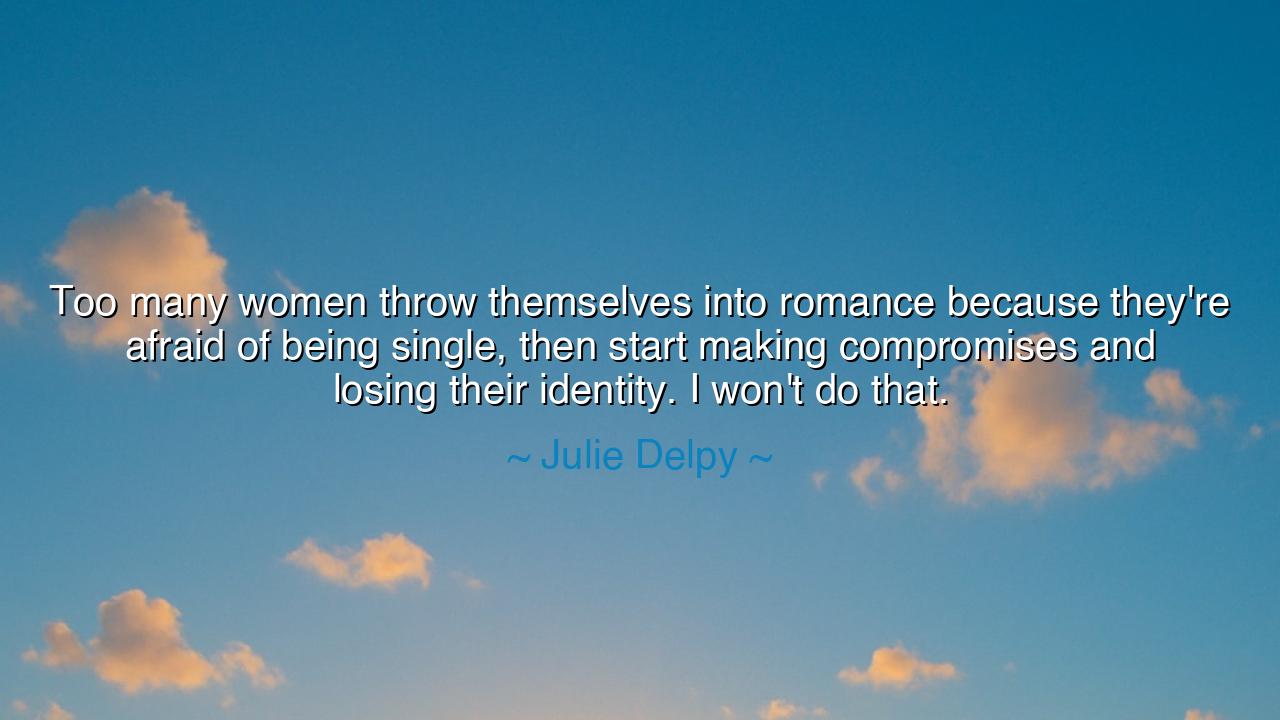
Too many women throw themselves into romance because they're
Too many women throw themselves into romance because they're afraid of being single, then start making compromises and losing their identity. I won't do that.






“Too many women throw themselves into romance because they’re afraid of being single, then start making compromises and losing their identity. I won’t do that.” Thus speaks Julie Delpy, actress, writer, and voice of clarity against the illusions of dependency. In these words lies a truth both ancient and modern: that fear of loneliness can drive the soul to surrender itself too quickly, and in surrendering, it may lose the very essence of what made it worthy of love in the first place. She warns that romance without selfhood is not a blessing but a chain, and that the preservation of one’s identity must be guarded even within the bonds of affection.
To throw oneself into romance out of fear of being single is to treat love not as choice but as refuge, not as a union of equals but as an escape from solitude. Yet solitude, though heavy, is not a curse—it is a crucible, where the soul discovers its own strength, its own voice, its own desires. To flee from it too quickly is to risk entering into unions where one bends, compromises, and eventually erases one’s self. Love should be the meeting of two whole beings, not the drowning of one in the other.
The ancients themselves warned of such loss of identity. Recall the tale of Eurydice, who followed Orpheus into the underworld, only to be lost forever because her fate was bound entirely to his choices. Or think of the women of myth who were transformed—Daphne into a tree, Io into a cow—because the wills of others overpowered their own. These stories echo Delpy’s caution: when identity is abandoned, when selfhood is surrendered, love becomes destruction rather than fulfillment.
History, too, provides lessons. Simone de Beauvoir, the philosopher and lover of Sartre, declared that women must never reduce themselves to mere extensions of their partners. She insisted that love must exist between equals, not as a compromise of freedom. Those who sacrificed their dreams, careers, or voices for the sake of being chosen often faded into history unnamed, while those who preserved their identity gave the world both love and legacy. Delpy’s words stand in the same tradition: she refuses to diminish herself in the name of romance.
Yet her declaration, “I won’t do that,” is not bitterness but courage. It is the voice of one who values selfhood above dependence, and who believes that love should not ask us to betray ourselves. To love truly is not to erase but to amplify—to see one another more clearly, to help each other grow, to celebrate the fullness of individuality. A romance built on fear may last a season, but a romance built on strength can endure a lifetime.
The lesson for us is clear: guard your identity as sacred, even in love. Do not rush into relationships to flee solitude, for solitude may be the very ground from which your truest self blossoms. Enter romance not out of fear, but out of abundance, when you are already whole. And when you do, refuse to compromise the essence of who you are. For love that demands your diminishment is not love but captivity.
Therefore, beloved listener, let Delpy’s wisdom be your shield. Do not tremble before the silence of being single; see it instead as the space where your spirit grows strong. Do not surrender your dreams or compromise your voice for the illusion of safety. Walk into romance as yourself, unbroken, unafraid, radiant with identity. For only then will love not consume you, but honor you, and in honoring, it will become the truest kind of union: two souls, whole and unyielding, walking together without fear.






AAdministratorAdministrator
Welcome, honored guests. Please leave a comment, we will respond soon